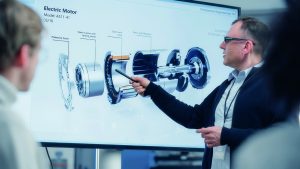 The electric vehicle (EV) revolution is rapidly transforming the automotive industry and transportation landscape. To meet the growing demand for sustainable mobility solutions, a skilled workforce well versed in EV engineering is crucial.
The electric vehicle (EV) revolution is rapidly transforming the automotive industry and transportation landscape. To meet the growing demand for sustainable mobility solutions, a skilled workforce well versed in EV engineering is crucial.
Transportation is one of the significant contributors to global greenhouse emissions, which has accelerated the adoption of EVs in this sector. EVs represent an efficient way to move products and people, and also facilitate the transition towards a clean energy economy.
EV engineering programmes provide a comprehensive overview of EV systems (for example, vehicle designs and control systems), charging infrastructure, battery technologies and grid integration for students. The programme curriculum covers EV architectures, electric motors, energy storage systems and basic power electronics.
These programmes enable learners to explain the role of EVs in the clean-energy transition, understand the design and role of battery management systems and applications, analyse the difficulties of integrating EVs into the electric grid, and differentiate between the battery technologies’ applications, including lithium-ion batteries, battery capacity, cell balancing and ageing factors.
Additionally, students can comprehend the disadvantages and advantages between battery EV, plug-in hybrid EV (PHEV), and hybrid EV (HEV) systems, and assess the charging technology basics and future charging solutions such as battery swapping, wireless charging and fast charging strategies.
Programmes by region
North America: Programmes in North America often emphasise practical applications and industry collaboration. For instance, the College of Engineering & Computer Science of the University of Michigan-Dearborn offers a certificate programme, referred to as the engineering of electrified vehicular systems, to students. This certificate programme provides fundamental vehicle electrification principles, with a special emphasis on applying these principles to evolving automotive technologies.
The programme covers electric and hybrid drives, battery technology, vehicle electronics and automotive powertrains. Students can complete this programme by selecting four courses from the available options. For example, they can choose the Energy Management of EVs course, which covers optimising energy consumption, longitudinal dynamics of EVs and modelling powertrain components.
Mathematical models are developed to analyse the vehicle systems’ energy consumption, and optimisation and optimal control fundamentals are studied to create energy management strategies for energy-efficient propulsion of ground vehicles. Similarly, the Powertrain Noise, Vibration, and Harshness (NVH) of EVs course focuses on the NVH characteristics of EVs, HEVs and PHEVs.
The key topics include mechanical vibration and acoustics principles, electrical accessory noise, regenerative braking systems, cooling fan noise, and driveline-induced noise/vibration from electrical motors/generators and conventional internal combustion engines. The Battery Systems, Modeling, and Control course covers control, modelling and estimation techniques for battery systems.
Students will learn about the functioning of electrochemical systems and a battery system’s thermal behaviour and modelling. The course also covers the basic battery management system functions for monitoring state-of-health, state-of-power and stateof-charge.
Electric-drive in US
The Electrical Aspects of HEV course introduces the electrical aspects and fundamental concepts of HEVs, including the battery and other energy storage devices, electric propulsion systems, design, control and modelling. It covers hybrid vehicles’ specifications, practical design considerations, series and parallel HEV design, regenerative braking, energy sources and vehicle dynamics.
Similarly, the College of Engineering of Wayne State University (also Michigan) offers an Electric-Drive Vehicle Engineering certificate programme to promote the electrification of vehicles and reduce the environmental impact of petroleum-based fuel systems and the dependence of the US on imported fossil energy.
Wayne State was the first university to launch a comprehensive electric-drive vehicle engineering curriculum in 2010. The university is associated with the US Department of Energy and automotive suppliers and manufacturers. It aims to prepare and educate a scientific and technical workforce for the EV industry and to disseminate technical information on emerging electric-drive vehicle technologies.
The goal is to implement and develop advanced educational programmes in electric-drive vehicles, including a master’s degree in electric-drive vehicle engineering.
Programmes in Europe
European programmes have a strong focus on research and development, with an emphasis on energy efficiency and sustainable practices. For instance, Oxford Brookes University in the UK offers a postgraduate Master’s degree programme in Automotive Engineering with EVs, covering specialist automotive subjects.
Students will learn to fully diagnose and analyse components and assemblies and determine the management techniques critical for design and engineering. The compulsory study modules include NVH, EV systems, advanced powertrain engineering, advanced vehicle dynamics, and composite design and impact modelling.
Specifically, the EV module develops a holistic understanding of EVs with a special emphasis on advanced vehicle propulsion technology.
Industry-sponsored projects from international and national companies, including Arctic Truck and McLaren, are available for students. Additionally, they can work closely with a commercial/research organisation of their choice as part of their project.
 Similarly, the UK’s Coventry University offers a postgraduate Master’s degree programme in Electrical Automotive Engineering to provide the required expertise to meet the demands of the modern transportation market.The programme aims to provide a comprehensive understanding of the current EV/HEV technology, challenges and concepts, and develop practical and academic skills in power electronics, batteries, and electrical machines and drives, covering every aspect of the vehicle’s powertrain.
Similarly, the UK’s Coventry University offers a postgraduate Master’s degree programme in Electrical Automotive Engineering to provide the required expertise to meet the demands of the modern transportation market.The programme aims to provide a comprehensive understanding of the current EV/HEV technology, challenges and concepts, and develop practical and academic skills in power electronics, batteries, and electrical machines and drives, covering every aspect of the vehicle’s powertrain.
Coventry University has strong links with several industry collaborators, including Ford Motor, Jaguar Land Rover and Schneider Electric Systems UK. The institution also runs the Centre for Advanced Low Carbon Propulsion Systems lab and Microcab, which are dedicated to the development of EVs and hydrogen fuel vehicles.
Italy’s University of Modena and Reggio Emilia International offers a Master’s degree programme in EV engineering that focuses on the main subsystems making up an electric driveline, including battery charger (on-board charger and fast charger), drive, energy storage system, thermal management, failure modes, control algorithms, electric safety, and electrical, mechanical, and functional interfacing.
This programme will enable learners to process innovative and original solutions within electric systems, drives and machines in advanced research for new functions in concept vehicles.
Programmes in China
EV engineering programmes in China often focus on mass production and cost-effective EV design, catering to the high-volume car manufacturers in the region. For example, the Department of Electrical and Electronic Engineering of The Hong Kong Polytechnic University offers a Master of Science in EVs. This degree programme aims to provide graduates with a holistic understanding of EVs, encompassing both practical and research applications. The facility says that through a well-rounded curriculum, students will gain a thorough knowledge of different EV aspects, including EV design, energy solutions, technology and management.
Additionally, the programme aims to address the rising demand for highly skilled professionals in the EV domain in China due to the presence of high-volume EV manufacturers in this region.
Areas of specialisation
Many EV engineering programmes offer advanced specialisations to cater to specific areas within EV engineering, such as wide bandgap technologies, powertrain design and fuel efficiency.
In 2015 Toyota incorporated SiC diodes and transistors in the inverter and the internal DC/DC converter of the power control unit for the Camry hybrid prototype. An all-GaN vehicle buggy using a GaN inverter, jointly researched by Toyota Advanced Power Electronics, Future Materials and Systems Research Institute (Japan), and Nagoya University of Japan, conducted an on-road test successfully at the Fuji Speedway in 2019.
The University of Windsor in Canada offers a non-credit EV Powertrain Systems course that provides learners with fundamental knowledge about EVs’ creation. The course covers several topics, including battery energy storage and charging, control of the powertrain, power electronic converters, various electric motor technologies, EV powertrain component design based on vehicle dynamics and drive cycle, and EV powertrain architecture.
University-industry collaborations
Collaborations between university and industry play an important role in the advancement of EV technology. For instance, Protean Electric is collaborating with the Department of Automotive Engineering of Tsinghua University, China, in the study of distributed traction control using in-wheel electric motors on new energy vehicles.
Recently, a co-operation memorandum was signed between Nissan (China) Investment Co, Ltd and Tsinghua University to establish the Tsinghua University (School of Economics and Management)-Nissan Joint Research Center for Automotive Sustainable Development. The research centre will initiate two major research projects, including the development of business models for the EV ecosystem.
NIO, a global smart EV company based in China, announced a strategic partnership with Istvan Szechenyi University Foundation of Hungary to accelerate the green transformation of the energy and automotive sectors in China and Hungary.
The co-operation agreement includes advancing battery diagnostics and management to extend the performance and life of EV batteries and optimising the utilisation of EV batteries for energy storage for supporting the grid during peak times.
The different approaches and expertise available to emerging automotive electronics engineers show that developing and optimising EV design is important around the world and that different regions are exploiting their local expertise and resources.
 Electronics Weekly Electronics Design & Components Tech News
Electronics Weekly Electronics Design & Components Tech News



